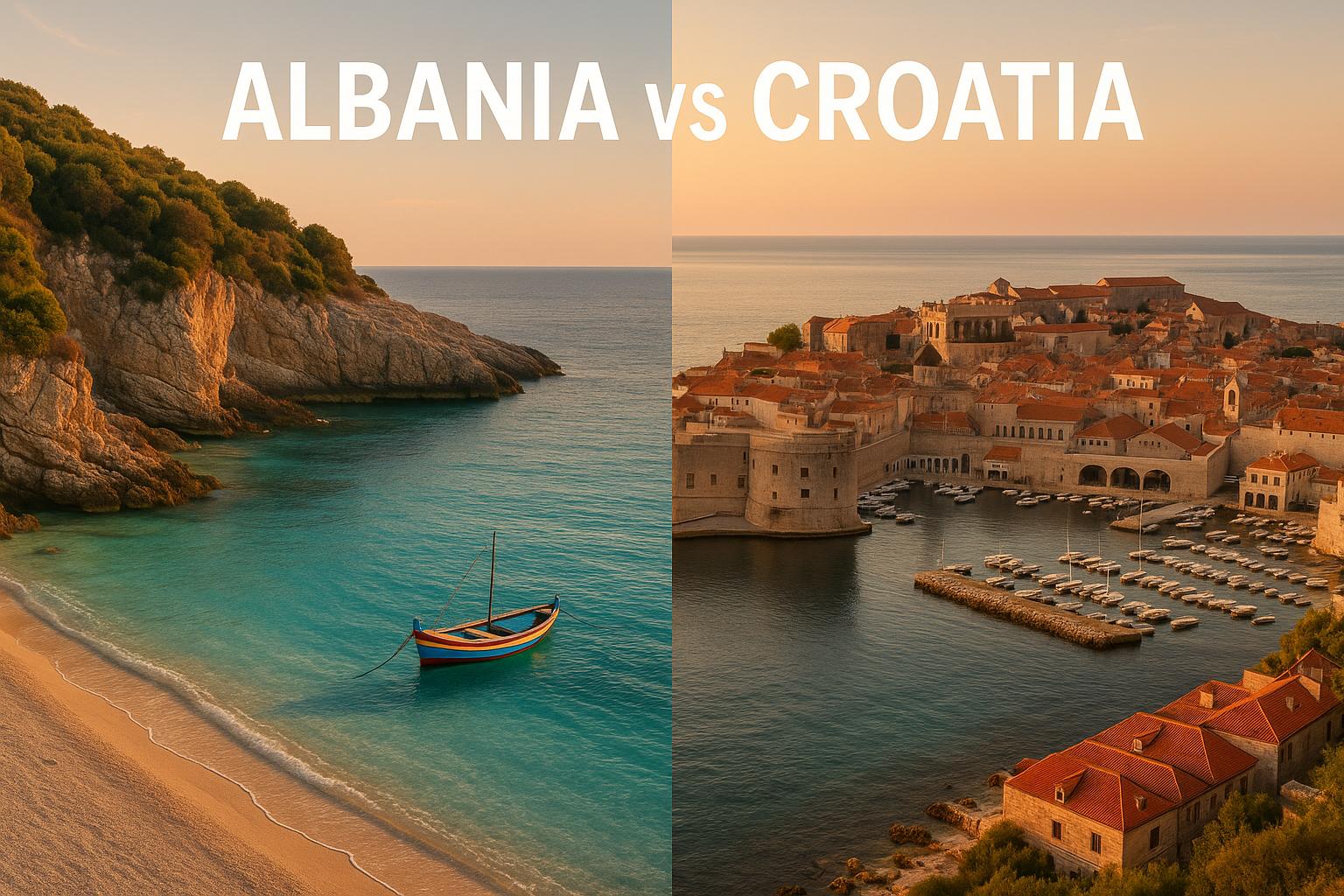Health insurance is mandatory for most visa types in Albania. Whether you're a digital nomad, long-term resident, or short-term visitor, proof of coverage is required to meet visa criteria and ensure access to medical care. Here's a quick breakdown:
- Digital Nomad Visa: Requires health insurance with a minimum coverage of €30,000 for the entire stay, including emergency repatriation and private healthcare.
- Residency Permit: Coverage must range between €30,000 and €50,000, matching the duration of your stay. Both local and international providers are accepted.
- Short-Term Visitor Visa: Insurance is mandatory for visa applicants, with a recommended minimum coverage of €30,000. EU citizens staying under 90 days are exempt but encouraged to have insurance.
All policies must cover medical expenses in Albania and meet documentation standards, including translation if not in Albanian. Local and international providers offer plans tailored to these needs. Proper insurance ensures a smoother visa process and peace of mind during your stay.
1. Digital Nomad Visa Health Insurance
Is Health Insurance Mandatory?
Yes, health insurance is a non-negotiable requirement for Albania's digital nomad visa (officially called the Unique Permit for Digital Mobile Workers). Without valid health insurance, your application will be denied, and you won’t have access to essential healthcare services during your stay.
What Are the Minimum Coverage Requirements?
To qualify, your health insurance must provide coverage of at least €30,000 and remain active for the entire duration of your stay in Albania. Additionally, the policy must explicitly cover medical expenses incurred within Albania. Double-check this detail with your insurer to avoid any issues.
What Should the Policy Cover?
Meeting the €30,000 minimum is just the starting point. Your policy should also include:
- Emergency repatriation: In case you need to be transported back to your home country for medical reasons.
- Private healthcare services: Public healthcare might not meet your expectations, so private coverage is essential.
Keep in mind that standard travel insurance or an EHIC card won’t cut it. These options usually lack the comprehensive coverage required for long-term stays.
Which Insurance Providers Are Accepted?
Albania accepts policies from both local and international insurance providers. Here’s what you should know:
- Local insurance plans: Prices range from €450 to €760 per year, depending on the level of coverage. For example, a "Superior" package offering €30,000 in coverage might cost around €610 annually.
- International insurers: Monthly premiums are typically between €30 and €150, depending on the provider and coverage. Companies like SafetyWing are known to meet Albania’s requirements, as noted by Bright!Tax Expat Tax Services.
If you’re unsure about which policy to choose, consulting an independent broker can help ensure your insurance aligns with all visa criteria.
2. Residency Permit Health Insurance
Mandatory/Optional Status
Health insurance is a mandatory requirement for anyone applying for a residency permit in Albania. Whether you're seeking a temporary or permanent permit, you must include proof of valid health insurance in your application. The policy must remain active for the entire period of your authorized stay.
Minimum Coverage Requirements
Residency permits generally require health insurance with coverage ranging from €30,000 to €50,000. The standard minimum is €30,000, designed to cover serious medical situations like emergencies, hospital stays, or medical evacuations. The policy must specifically cover expenses incurred within Albania during your stay. This higher coverage threshold ensures long-term residents have access to adequate healthcare services.
Scope of Coverage
Residency health insurance must provide broad coverage for medical services in Albania. Unlike short-term visitor insurance, these policies are tailored for long-term needs, covering both routine care and emergencies. If you're employed in Albania, you’ll contribute to the public healthcare system through payroll taxes, which grants access to universal healthcare. However, many expats choose private or international insurance plans, as these often include a wider range of services.
To meet these requirements, both local and international providers offer plans specifically designed for residency needs.
Eligible Insurance Providers
Residency permit applications accept policies from both local Albanian and international insurance providers. Local companies such as Albsig, Sigal, Eurosig, and Intersig offer plans with coverage ranging from €10,000 to €50,000. Annual premiums typically start at around €450.
International providers like Allianz, Cigna, MSH International, AXA, Bupa Global, and IMG are also widely accepted. Monthly premiums for these plans range between €30 and €150, depending on the level of coverage. For example, Allianz offers global coverage with benefits up to $5,000,000, while Cigna provides international health plans with worldwide coverage and 24/7 customer support.
The U.S. Embassy in Albania advises obtaining supplemental insurance to cover medical evacuation costs. They also note that U.S. Medicare/Medicaid does not apply overseas, and most international providers do not accept U.S. health insurance.
Albania: Easier Immigration Law for Retirees and Digital Nomads
sbb-itb-dfcc1b7
3. Short-Term Visitor Visa Health Insurance
Short-term visitor insurance is designed to cover essential emergency medical care, offering a more focused approach compared to the broader policies for digital nomads or residents.
Mandatory or Optional?
If you're applying for a visa as a short-term visitor, having health insurance is a must. For EU citizens who don't need a visa and plan to stay for up to 90 days, there's no requirement to show proof of insurance. However, it's highly recommended to have comprehensive coverage. For tourist visa applicants, be ready to provide valid health insurance proof that covers your entire stay, as this may be checked when you arrive.
Minimum Coverage Requirements
The specific minimum coverage amounts can vary, but policies for short-term visits generally need to cover essential medical expenses. Make sure your insurance includes treatment in Albania and emergency services like medical evacuation, ensuring you're well-protected during your trip.
What Does It Cover?
These policies typically focus on emergencies and unexpected health issues. Coverage often includes emergency room visits, hospital stays, ambulance services, prescription medications, and sometimes trip interruption benefits.
Choosing the Right Provider
Many travel insurance and international health insurance companies offer plans tailored for short-term visitors. Before purchasing, review the policy details to confirm it meets Albania's entry requirements and aligns with your travel needs.
Always check with Albanian authorities for the latest requirements before your trip.
Comparison of Requirements
Grasping the differences in health insurance requirements for various visa types is crucial to selecting the right coverage and avoiding delays in your application. The table below highlights the key insurance criteria for each visa category:
| Visa Type | Insurance Status | Minimum Coverage | Duration Requirements | Accepted Providers |
|---|---|---|---|---|
| Digital Nomad Visa | Mandatory | €30,000 - €50,000 | Must cover the entire visa period (up to 1 year) | Local Albanian and international providers |
| Residency Permit | Mandatory | €30,000 - €50,000 | Must cover the entire intended stay period | Local Albanian and international providers |
| Short-Term Visitor | Highly recommended | €30,000 (recommended) | Must cover the entire stay (up to 90 days) | Travel and international insurance companies |
The most striking difference lies in the mandatory insurance requirement for Digital Nomad and Residency visas, compared to the more flexible recommendation for short-term visitors. All three categories suggest coverage between €30,000 and €50,000, but enforcement varies depending on the visa type.
For Residency Permit holders, the process demands additional attention. While Albania’s public healthcare system offers basic services, private insurance is essential not only for comprehensive care but also to meet application requirements. Residency applicants must secure private insurance before submitting their applications. EU nationals, however, can often supplement their European Health Insurance Card (EHIC) with private coverage for added security.
Timing also plays a role in these requirements. Applicants for Digital Nomad and Residency visas must arrange insurance before submitting their applications, whereas short-term visitors have more flexibility. However, it’s advisable for all visitors to have proof of insurance upon arrival to avoid any potential delays.
Regardless of the visa type, both local and international insurers are acceptable as long as the policy explicitly states the required minimum coverage amounts and matches the entire duration of your stay in Albania. Opting for higher coverage can also provide added peace of mind, especially when dealing with Albania’s private healthcare costs.
Conclusion
Health insurance requirements in Albania differ depending on your visa type, but the shared objective is clear: ensuring uninterrupted coverage during your stay. Whether you're visiting for a short trip or planning a long-term residency, understanding these rules is key to a hassle-free visa process.
For those applying for the Unique Permit, comprehensive international health insurance is mandatory. Short-term visitors, on the other hand, need standard travel insurance that covers their entire stay. Digital nomads are required to maintain international insurance with a minimum coverage of €30,000, including emergency repatriation, for the duration of their time in Albania. It’s also worth noting that the Unique Permit must be renewed annually, for up to five years, so planning for continuous coverage is essential.
If you're a short-term visitor, having travel insurance that spans your trip is crucial. And if you're mapping out your travels, services like Discover Albania can help you explore the country’s many stunning regions.
With the right insurance in place, you can fully enjoy your time in Albania without worrying about unexpected medical expenses.
FAQs
What kind of health insurance do digital nomads need for staying in Albania?
If you're a digital nomad planning to settle in Albania, it's crucial to have international health insurance with at least €30,000 in coverage. This should cover hospital care, emergency medical treatment, and repatriation. Not only is this often a requirement for securing a visa, but it also ensures you're prepared for any medical needs during your stay.
For extra security, look into policies that include private healthcare access, emergency evacuation, and 24/7 support. These benefits can be a lifesaver if you face unexpected health issues while enjoying Albania’s vibrant cities, stunning beaches, or breathtaking mountains.
What health insurance do EU citizens need for short visits to Albania (under 90 days)?
EU citizens planning to visit Albania for less than 90 days should consider getting travel medical insurance to cover potential emergency medical expenses. While Albania might not always mandate health insurance for short-term stays, having it can save you from unexpected costs if something goes wrong.
Ensure your policy covers accidents, illnesses, and emergency care during your trip. It’s also wise to check that your insurance provider includes Albania in their coverage and aligns with any visa-related requirements, if those apply to your visit.
Which health insurance providers are recommended for residency permit applications in Albania?
When applying for a residency permit in Albania, Albsig and Eurosig are two popular choices for health insurance. Among them, Albsig is often praised for offering plans that cater to various needs while ensuring broad coverage.
Make sure that the policy you choose aligns with Albania's residency permit requirements, particularly for medical emergencies and hospital stays. To avoid complications, double-check the policy details with local authorities before proceeding with your application.


